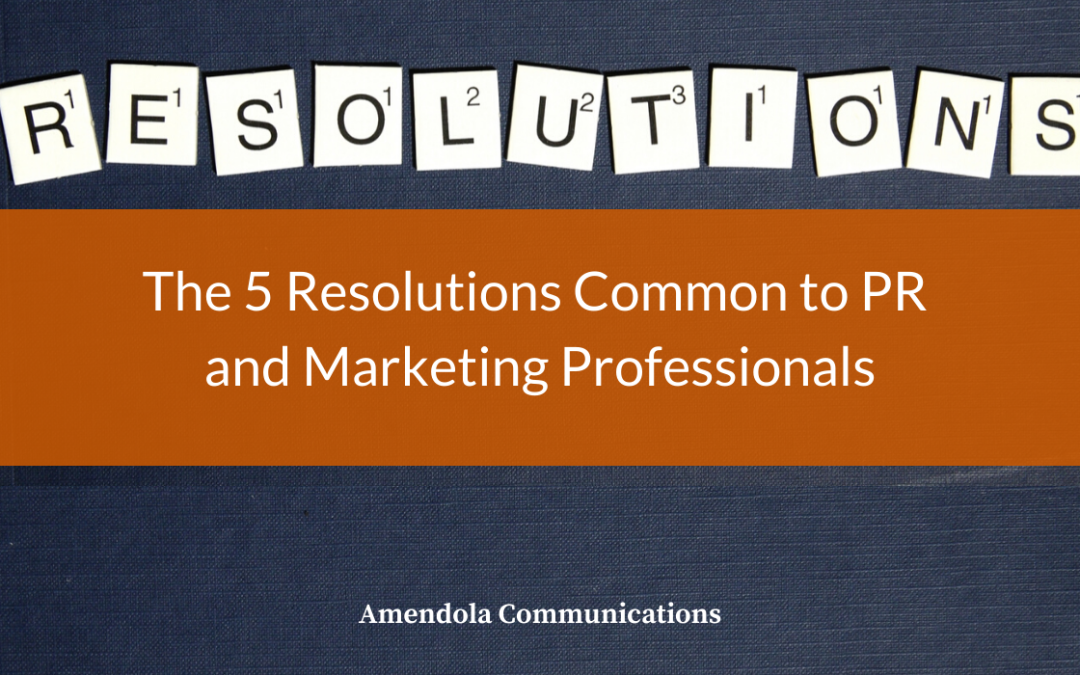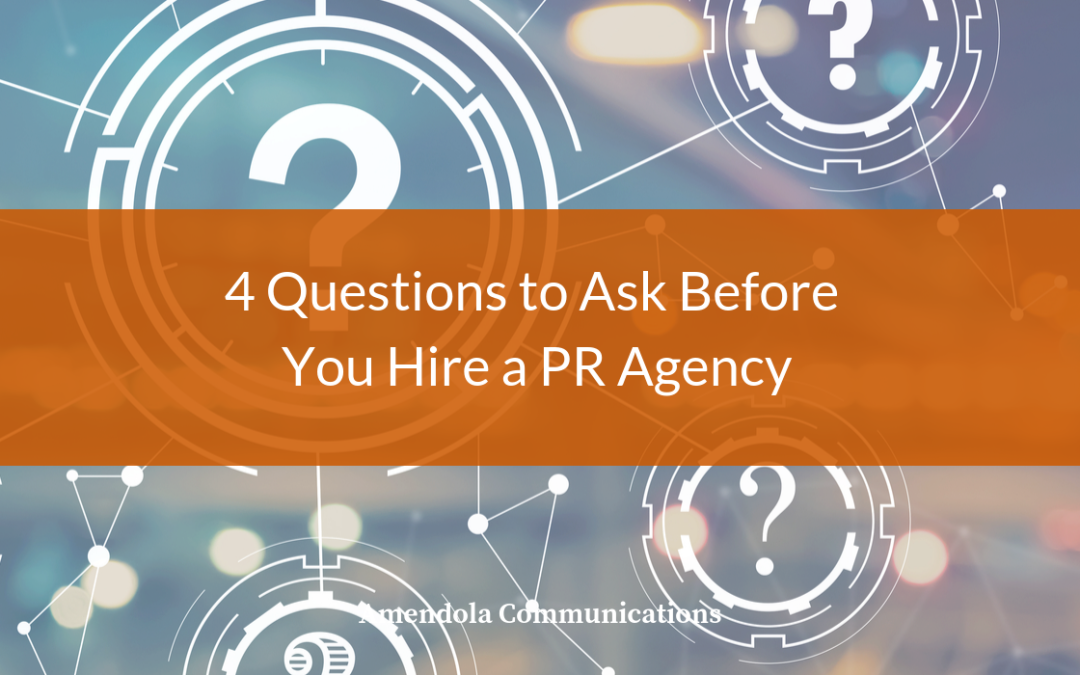
by Stacy State | Feb 19, 2020 | Blog
We are a few months into the new year and it’s that time when we begin to reevaluate the resolutions we originally set. Were we being overly optimistic? Are these goals still achievable? Do we restart again?
The New Year has always marked a great starting point for assessing the changes we want to make in our lives both personally and professionally. The personal goals seem to be easier to make while professional goals sometimes get shoved to the side.
With the fast-pace and pervasive changes that occur within public relations and marketing, it’s important that we as PR and marketing professionals set meaningful goals and track our success toward them throughout the year. In speaking with colleagues within this field, what are some of the common resolutions we set for ourselves?
1. Set a content strategy at the beginning of the year. Lofty, yes, I know. But as professionals responsible for content marketing and thought leadership, knowing what topics to focus on according to a set calendar greatly speeds the delivery and production of great thought leadership pieces, white papers, blogs, e-Books and many other content deliverables.
Aligning topics with the content calendars for relevant media publications is also critical to success. If you know a certain trade publication will focus on health for the month of February then aligning your content accordingly will not only make it easier for your teams to deliver. It will also make it more likely that it gets published so you can reap the rewards of utilizing the information in multiple outputs across multiple channels.
2. Use data to drive strategy. While marketing and communications was once a more ambiguous and subjective art form rather than a science, it is now becoming easier to track results of activities due to the introduction of technology. In fact, many companies now demand to see results such as the number of new leads, the click-thru rates, and share of voice.
And as PR and marketing professionals, we too should demand and want to see the results of our labor. Knowing what messaging works and why for which type of customer is key to delivering even better communications and campaigns moving forward. It benefits everyone when we “work smarter and not harder” and being informed about how our past activity has performed is an important step to achieving that.
3. Don’t make perfect the enemy of good. This quote, often attributed to the French writer, Voltaire, really resonates with many in the PR and marketing profession. As writers and creators of content and design, there is often a pride that comes with a beautifully written piece, a new innovative spin on an overly discussed topic or a flawless pictorial of a convoluted concept.
After all, these are the moments we live for the times we get to deliver into the world a masterpiece that shows our years of schooling and experience. It’s times like these though that we must remember Voltaire’s words of wisdom for it is easy to get caught up in trying to make perfect what is already seen as great by many.
4. Read more but don’t get lost. As great PR, media relations and marketing professionals it’s often in our nature (and part of the job) to learn what’s going on in the world around us. We want and need to know what our competitors said in the New York Times yesterday or what topic is trending with our consumers/buyers.
While the expectations and deliverables can pile on us quickly, it’s nearly impossible to do our jobs (or do them well) without taking time out to understand the market, read what consumers are saying and stay ahead of the next big news story or product development. The caution here is that while reading and being aware of the industries we serve is critical to success, it can also consume hours and hours without realizing the time that’s gone by.
5. Find the best local coffee (or tea). The markets and the news never stop from east coast to west coast or one country to the next so there is always something going on and someone awake to report on it. As marketers and PR professionals we often are early to rise and are rarely without a pile of stories or new strategies to deliver. Finding the best caffeinated beverage, therefore, is key.
If you’ll be consuming it daily (or multiple times a day), then the taste is critical, but the cost must be reasonable as well. We’re marketers, we’re media relations you can’t fool us. We can write great thought leadership for the best coffee in town. We can create amazing brand awareness and even help you generate new leads and customers. Yes, we’ll work in trade for great coffee or tea.

by Jodi Amendola | Oct 16, 2019 | Blog
There are many great reasons companies hire a PR agency.
Start-ups often do it to create a “larger than life” image in the marketplace. Having your executives interviewed by top industry trade media, or having your thought leadership published in top publications, helps build brand awareness and elevates the perception of the company’s position in the industry – an important factor when selling against larger, more established competitors. There’s nothing like having an industry analyst tell a small client they thought the client was much larger based on all the publicity they’ve received.
More established organizations may hire a PR agency to help change a negative perception into a positive one. They may do it to help generate sales leads or provide “air cover” for salespeople when they meet with a prospect – especially when the product has a long sales cycle. They may do it to position themselves for an acquisition, because a great PR campaign can help bring them to the attention of larger organizations looking for good companies to purchase.
Yes, there are lots of good reasons to hire a PR agency. But what’s important to understand is that there’s more to it than simply signing a contract and telling the PR agency to go do their thing.
It’s also going to take effort and commitment on the part of the client and its executives.
That’s why I recently wrote a blog post for the Forbes Agency Council titled, “Four Questions to Ask Before You Hire a PR Agency.” It looks at both the strategic and tactical areas organizations should consider before they contract with a PR agency if they want the relationship to be a success. Here’s a quick excerpt from the first question:
“Every business has the same goal: growth. The challenge, of course, is identifying how to get there. That’s why, before engaging with a PR firm, it’s helpful to develop specific goals that you’re looking to accomplish. Maybe it’s acquiring more clients in a new market vertical, establishing your CEO as a thought leader, or polishing up your company’s messaging. Regardless, a PR firm can’t help you reach your objectives if you haven’t first defined them. “
Other areas covered include the corporate culture, the need for a dedicated account liaison and the fact that unlike advertising or self-publishing, where you have total control over when, where and how your story appears, you have to be willing to accept that everything won’t always be to your liking in PR.
If you’re thinking about hiring a PR agency give this article a read. It can help ensure you’re really ready for a PR program – and that you make a good choice.
Or you can just contact me here at Amendola Communications. We’ll help walk you through the process and ensure your program achieves its goals.

by Heather Caouette | May 9, 2018 | Blog
Everyone knows that success is not created in a vacuum. Teamwork permeates everything we do. In sports, we know the names of some standout players, but it is how they work together that delivers wins.
In public relations and marketing agencies, clients depend on team members to not only know their craft but serve as an extension of the marketing teams. How individual stars execute as part of a larger, cross-functional team is where you will really see results.
What do you need to build a great team? Some of the best groups share a few key elements.
Shared Goals
Being part of a team is entering into a relationship, so remember your parents advice find people with similar goals. Working toward the same objectives builds comradery as well as teamwork. Clearly stating those goals ensures everyone is on the same page.
Complementary Strengths
Having a group of people who are carbon copies of each other, for those of you that remember print forms, is not only boring. It stifles innovation. Remember what Winston Churchill said: “If two people agree on everything, one of them is unnecessary.”
You want people with different experiences and assets to round out your team and bring ideas that you may not have come up with on your own. Identify what characteristics are needed to succeed. Know your strengths and recruit people that have different ones. Then, offer enough autonomy to let each member’s expertise shine.
Communication
Proper communication is the backbone of every good collaboration, so it must take into account people’s personal preferences. Colleagues can each react differently to how information is presented, so it is important to understand the nuances of your team.
Proactive feedback is also important to keeping the team on track. Don’t wait until there is a problem keep responses consistent to prevent issues. The ability to brainstorm, strategize and work through challenges is the result of good team communication. There is also an added bonus created from this trust.
Transparency
This takes communication to the next level. For teamwork to thrive, each member needs to execute off of the same playbook. Ensure your PR and marketing teams are in the know about your organization functionality in development, your key drivers, business decisions motivators, and the skinny on your customers favorite features. This enables teams to proactively act in your best interest and deliver real results.
Individuals can certainly accomplish many tasks from the outside; however, it is like passing to the Patriots Rob Gronkowski the ball will be caught, but maybe not as gracefully. Expertise is not always enough. Transparency removes the handicap and creates synergies that deliver above and beyond your expectations, tapping into resources that will best guide your programs to reach your business goals.
Public relations and marketing are about building your brand in a way that supports overarching business goals creating thought leadership, increasing brand awareness, motivating behavior from select groups. Don’t get lost chasing tactics. Keep your objectives in sight and build the team that will get you there.



